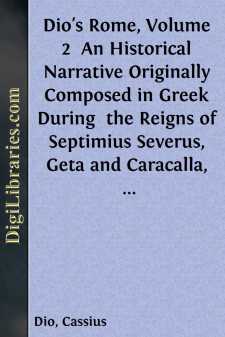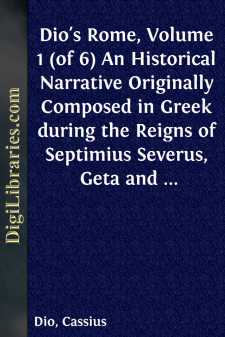History
- Africa 30
- Americas (North Central South West Indies) 50
- Ancient
- Asia 58
- Australia & New Zealand 8
- Canada 41
- Caribbean & West Indies 1
- Civilization 20
- Eastern Europe 12
- Europe 310
- Expeditions & Discoveries 60
- General 77
- Historical Geography 1
- Jewish 9
- Latin America 3
- Medieval 8
- Middle East 14
- Military 248
- Revolutionary 8
- Study & Teaching 5
- United States 353
- Western Europe 56
- World 13
Ancient Books
Sort by:
by:
Charles Morris
HOW ROME WAS FOUNDED. Very far back in time, more than twenty-six hundred years ago, on the banks of a small Italian river, known as the Tiber, were laid the foundations of a city which was in time to become the conqueror of the civilized world. Of the early days of this renowned city of Rome we know very little. What is called its history is really only legend,—stories invented by poets, or ancient...
more...
CHAPTER I. GIBBON'S EARLY LIFE UP TO THE TIME OF HIS LEAVING OXFORD. Edward Gibbon was born at Putney, near London, on 27th April in the year 1737. After the reformation of the calendar his birthday became the 8th of May. He was the eldest of a family of seven children; but his five brothers and only sister all died in early infancy, and he could remember in after life his sister alone, whom he...
more...
by:
Cassius Dio
BOOK 78, BOISSEVAIN.) [Sidenote: A.D. 211 (a.u. 964)] [Sidenote:—1—] After this Antoninus secured the entire power. Nominally he ruled with his brother, but in reality alone and at once. With the enemy he came to terms, withdrew from their country, and abandoned the forts. But his own people he either dismissed (as Papinianus the prefect) or else killed (as Euodus, his nurse, Castor, and his wife...
more...
by:
Cassius Dio
DURATION OF TIME M. Asinius Marcellus, Manius Acilius Aviola. (A.D. 54 = a.u. 807 = First of Nero, from Oct. 13th). Nero Caesar Aug., L. Antistius Vetus. (A.D. 55 = a.u. 808 = Second of Nero). Q. Volusius Saturninus, P. Cornelius Scipio. (A.D. 56 = a.u. 809 = Third of Nero). Nero Caesar Aug. (II), L. Calpurnius Piso. (A.D. 57 = a.u. 810 = Fourth of Nero). Nero Caesar...
more...
by:
Cassius Dio
(BOOK 52, BOISSEVAIN) [-1-] My record has so far stated what the Romans both did and endured for seven hundred and twenty-five years under the monarchy, as a democracy, and beneath the rule of a few. After this they reverted to nothing more nor less than a state of monarchy again, although Cæsar had a plan to lay down his arms and entrust affairs to the senate and the populace. He held a consultation...
more...
by:
Cassius Dio
BOOK 45, BOSSEVAIN.) [B.C. 44 (a. u.710)] [-1-] This was Antony's course of procedure.вÐâGaius Octavius Copia,вÐâthis was the name of the son of Caesar's niece, Attia,вÐâcame from Velitrae in the Volscian country, and having been left without a protector by the death of his father Octavius he was brought up in the house of his mother and her husband, Lucius...
more...
by:
Cassius Dio
BOOK 36, BOISSEVAIN.) The beginning of this book is missing in the MSS. The gist of the lost portion may in all probability be gathered from the following sentences of Xiphilinus (p. 3, R. Steph.): "When the consuls drew lots, Hortensius obtained the war against the Cretans. Because of his fondness, however, for residence in the capital, and because of the courts (in which his influence was only...
more...
by:
Cassius Dio
Four hundred and seven small pages, over and above the Epistle Dedicatory, are contained in Volume One. Really, however, this is not the true Dio at all, but merely his shadow, seized and distorted to satisfy the ideas of his epitomizer, the monk Xiphilinus, who was separated from him by a thousand years in the flesh and another thousand in the spirit. Of the little specimens here and there translated...
more...
by:
Sallust
THE ARGUMENT. The Introduction, I.-IV. The character of Catiline, V. Virtues of the ancient Romans, VI.-IX. Degeneracy of their posterity, X.-XIII. Catiline's associates and supporters, and the arts by which he collected them, XIV. His crimes and wretchedness, XV. His tuition of his accomplices, and resolution to subvert the government, XVI. His convocation of the conspirators, and their names,...
more...
"Corruption" in Ancient Rome And Its Counterpart in Modern History Two years ago in Paris, while giving a course of lectures on Augustus at the Collège de France, I happened to say to an illustrious historian, a member of the French Academy, who was complimenting me: "But I have not remade Roman history, as many admirers think. On the contrary, it might be said, in a certain sense, that I...
more...











